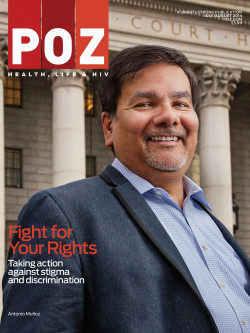The town of Clarksville, Indiana, is accused of unlawfully revoking a job offer to a qualified law officer after learning that he was HIV positive, according to a press release from the Department of Justice, which filed the lawsuit April 25.
The lawsuit maintains that such HIV discrimination violates the Americans with Disabilities Act (ADA), which considers HIV a disability. Title I of the ADA prohibits employers from discriminating against qualified individuals on the basis of disability.
When the officer was offered the job in 2015, he had already been volunteering with the town’s police department for over a year as a reserve officer. He had been given a conditional job offer and needed to pass a state-mandated medical exam.
The officer told the medical examiner he was taking antiretroviral medications under the direction of an HIV doctor, according to Fox59.com. The examiner noted that the applicant showed “no long-term evidence of active disease” but then told the chief of police that the officer didn’t meet the medical requirements because his “HIV was a ‘communicable disease’ that posed a ‘significant risk of substantial harm to the health and safety’ of his colleagues and the public,” according to court documents quoted by Fox59.
As the POZ Basics on HIV/AIDS explains, HIV is transmitted through body fluids such as blood, semen and breast milk, and it is generally contracted through unprotected sex or sharing needles, from mother to child during pregnancy or breastfeeding or from being stuck with a needle or receiving a blood transfusion. Given these transmission facts, the officer did not pose a danger to the safety of his colleagues or the general public.
Based on the examiner’s assessment, the police department revoked the job offer. After the applicant appealed the decision, however, the town of Clarksville acknowledged he was qualified and put him back on its hiring list—but the town never offered him a job.
He sought help through the Equal Employment Opportunity Commission, which eventually referred the case to the Justice Department.
“No qualified individual should lose a hard-earned career opportunity because of misguided views about their disability that are not supported by medicine or science,” Assistant Attorney General Kristen Clarke of the Justice Department’s Civil Rights Division, said in the press statement on the case. “This lawsuit reflects the Justice Department’s firm commitment to protecting qualified workers, including those with HIV, from unlawful employment discrimination.”
“Every day, we depend on law enforcement officers who put themselves in harm’s way to keep us safe,” added U.S. Attorney Zachary A. Myers for the Southern District of Indiana. “Those who are qualified and seek to serve their communities should not be subjected to unlawful discrimination. Individuals living with HIV are entitled to the full protection of our antidiscrimination laws. Our office will work closely with our partners in the Civil Rights Division to ensure that those who seek to serve the public are not unlawfully discriminated against.”

See our POZ cover story “Defying Discrimination” (pictured above) about taking action against stigma and discrimination. It includes tips on filing an HIV lawsuit.
The ADA does more than protect employees and job applicants against discrimination. Of note, Title III of the ADA states that public accommodations, such as doctor’s offices and hair salons, cannot deny services to people who have disabilities, including people living with HIV. This has led to countless lawsuits and settlements. For example, see “Nail Salon Must Pay $7,500 for Refusing Service to a Client With HIV.”
For more information on the ADA and HIV discrimination, visit ADA.gov/HIV. You can file an ADA complaint with the Department of Justice online and by mail. For more information about the ADA, visit ADA.gov, or call 800-514-0301 or 800-514-0383 (TDD).







3 Comments
3 Comments